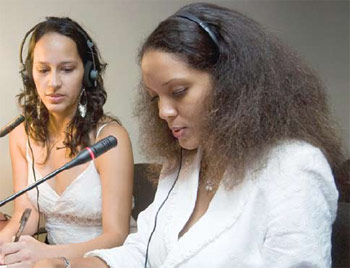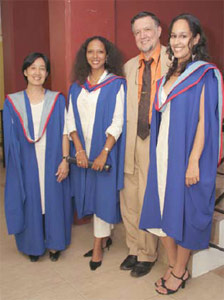 |
 |
 |
|
April - May 2008
|
Found in TranslationGerard Best talks with Eric Maitrejean about the new, in-demand diploma in Interpreting Techniques Interpreting,
which always involves speech, is distinct from translation, which
typically deals with the written word only. Interpreting,
which always involves speech, is distinct from translation, which
typically deals with the written word only.IN MODERN BOOTHS AT UWI: (L-R) Daniela Jodhan and Gennike Mayers The Postgraduate Diploma in Interpretation (due to be renamed Interpreting Techniques), which graduated its first cohort in November 2007, received dozens of applications for its September 2008 programme. The new programme’s first incarnation, offered by UWI St Augustine in 1994, was a Certificate in Conference Interpreting. “That programme was very short-lived,” recalled Programme Coordinator Eric Maitrejean. “It was offered only for one year, in collaboration with the University of Central London (now Westminster), with instructors being teachers of UCL and also staff interpreters at the Council of Europe in Strasbourg, France.” “The reason why UWI decided to revive it in 2006 was the fact that we noticed a lot of events taking place in Trinidad and Tobago—multilingual events involving regional and international organisations—and we realised that a lot of the interpreters were actually coming from the outside, not only outside of Trinidad and Tobago, but outside of the Caribbean. We realised that there was an untapped potential right here in Trinidad, with its large cosmopolitan society.” All the same, when the new programme was advertised in late 2005, it did not only attract locals, but also applicants from Argentina, Venezuela and Colombia. “It was very interesting to see the different backgrounds [of the applicants]. This was exactly what we wanted for the programme,” Maitrejean said. “We didn’t want to teach people to interpret into English alone and have only Englishspeakers enrolled. The richness of the programme came from the different profiles of the applicants.” Of the 26 applicants, 16 were selected, 12 completed the programme and 6 graduated. The 50 per cent pass rate met expectations, as the rigorous programme was the first of its kind in the English-speaking Caribbean. “It’s really something that demands that you be in tune with the foreign language,” said Maitrejean, who made an important distinction between casual conversational interpreting and the more rigorous demands of the formal, professional activity, which requires in-depth knowledge of a variety of fields, a huge range of vocabulary and a facility with language learning. He went on to add that the new UWI programme is comparable to similar programmes in Mexico, California, Venezuela, Paris, Geneva, Brussels and London, but students in the UWI programme have an “edge”, Maitrejean explained, because of the amount of practical experience available to them in Trinidad. For example, the recently graduated cohort gained valuable real-world experience at a number of high-profile international events, including the Association of Caribbean States (ACS) meetings at its Port of Spain headquarters, and the 2007 Haiti Now! Art, Film and Literature seminar hosted by UWI St Augustine, among many others. “We had students in mixed teams (sharing the booths with seasoned interpreters) at the European-Latin American Summit on Drugs, which was hosted in Trinidad, and the delegates came to congratulate the team as is done traditionally when the job is very well done, but when they heard that some of the interpreters were students, they were very, very impressed,” said Maitrejean. He added that of the six graduates of the new programme, four had already interpreted at conferences following the completion of the programme. Maitrejean also explained the meaning of the Programme title ‘Interpreting Techniques’. The word “Techniques,” he said, refers to the four main professional competencies that the course aims to develop, namely Consecutive Interpreting, Simultaneous Interpreting, Whispering Interpreting and Oral Translation. Consecutive Interpreting, he explained, is a technique in which interpreters use their memories and holophrastic notes to render whole speeches from one language to another. Simultaneous Interpreting, on the other hand, takes place in conferences and seminars, where professional interpreters sit behind closed doors in discrete ‘fishbowls’ and use headsets and microphones to instantly relay spoken translations to conference participants. Whispering Interpreting (also called Liaison Interpreting) applies in an outdoor or roving configuration, where interpreters perform their task without the help of interpreting equipment, (hence the term ‘Whispering’). Interpreting, which always involves speech, is distinct from translation, which typically deals with the written word only. Oral Translation, however, is an interpreting technique which involves the instant translation and oral rendering of written passages. This technique is also called Sight Translation, since interpreters are required to render translations of written passages on sight. Fortunately, the new Interpretation programme has also benefited from another landmark initiative, the recent establishment of the Caribbean Interpreting and Translation Bureau (CITB). This was established by the UWI Faculty of Humanities and Education in 2005 in response to increasing demands from the academic community and the business sector. The CITB has been able to capitalize on the local and international opportunities for the provision of qualified services in translation and interpreting. Ultimately, the Bureau has been able to harmonise individual and institutional efforts in the provision of these services, allowing for a centrally managed Faculty and Campus resource. “When the CITB quoted for an event, we mixed the students with seasoned interpreters. So not only did students get a chance to practice, but they got a chance to listen to experienced interpreters working at a real event,” said Maitrejean. Over the past three years, the Bureau has provided interpreting services at several high profile events in the business and public sectors, including the ARPEL Emergency Response Planning Working Group Meeting, the Ministry of Housing’s 2006 Colloquium, and the 31st Annual Caribbean Studies Association Conference. The CITB has also translated marketing and promotional material for several state and private sector organizations including, eTecK, Tourism Development Co., Blue Waters, Petro-Canada Ltd., and the Caribbean Health Research Council. CITB Director, Dr Beverly-Ann Carter, explained that providing an avenue for students to gain real-world exposure, has always been part of the Vision of the CITB: “The CITB was intended to act as an incubator for proficient undergraduate linguists from the degree programmes, or recently qualified interpreters from the postgraduate Diploma in Interpreting, who could be attached as apprentices to the qualified and experienced translators and interpreters contracted by the CITB.”  The
Bureau is situated at the Centre for Language Learning (CLL), the locus
of language services on the St. Augustine Campus. The CLL, which is
directed by Dr Carter, is one of the two buildings on the St Augustine
campus which have been outfitted with cutting-edge DIS (Danish
Interpretation Systems) equipment, the preferred simultaneous
interpreting apparatus, used by the World Bank, the Caribbean Court of
Justice and other national, regional and international agencies. It’s
apparent that the infrastructure is in place to usher the programme to
the next phase of its evolution. The
Bureau is situated at the Centre for Language Learning (CLL), the locus
of language services on the St. Augustine Campus. The CLL, which is
directed by Dr Carter, is one of the two buildings on the St Augustine
campus which have been outfitted with cutting-edge DIS (Danish
Interpretation Systems) equipment, the preferred simultaneous
interpreting apparatus, used by the World Bank, the Caribbean Court of
Justice and other national, regional and international agencies. It’s
apparent that the infrastructure is in place to usher the programme to
the next phase of its evolution.“I think the future of the programme is internationalising it, offering it to people outside of Trinidad and Tobago,” reflected Maitrejean. “We now have the potential to advertise it in French-speaking and Spanish-speaking countries, as well as Caricom territories, so that it can also attract people who are not based in Trinidad and Tobago.” CELEBRATING ON GRADUATION DAY: (L-R) Maria Jose Iino, Gennike Mayers with Eric Maitrejean (Programme Coordinator) and Daniela Jodhan |
